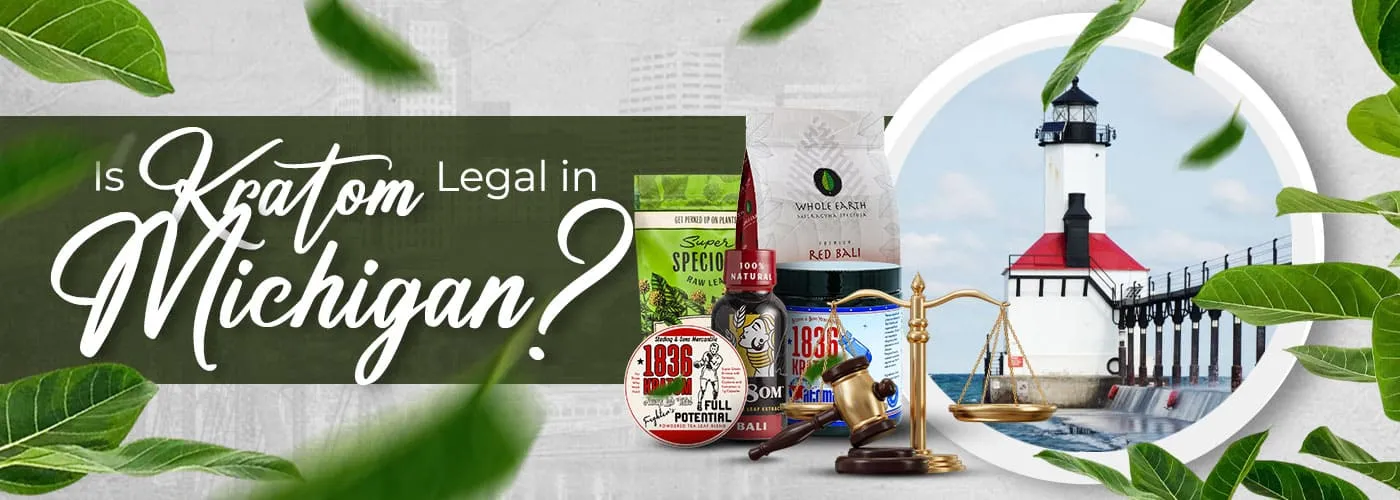If you’ve spent any time browsing wellness forums, alternative health shops, or even just your local smoke shop, chances are you’ve heard about kratom. Hailing from the tropical forests of Southeast Asia, this plant (Mitragyna speciosa) has been celebrated for centuries for its stimulating and relaxing effects, depending on the dose. Some people swear by it for energy and focus, while others use it as a calming ritual. But as kratom’s popularity has grown in the U.S., so has the legal debate. Different states have taken very different stances—some allowing it freely, others regulating it tightly, and a few banning it outright. Which brings us to the big question: Is kratom legal in Michigan?
The short answer: Yes, it’s legal. But as with most things in life, the full story is more nuanced. Let’s break it down.
Kratom’s Legal Status in Michigan
Michigan currently allows the purchase, possession, and use of kratom. There are no statewide bans, and you can walk into a local shop or order it online without fear of breaking the law.
Unlike states such as Indiana (where kratom is banned) or Utah (where it’s regulated under strict consumer protection laws), Michigan sits in the middle ground: legal but largely unregulated. That means kratom products are widely available, but oversight is minimal.
So yes—you can legally enjoy kratom in Michigan. But what you buy and what’s inside the package? That’s another matter entirely.
Why Regulation is Still a Grey Zone
While Michigan allows kratom, it doesn’t yet regulate the market. That means:
- No standardized testing requirements.
- No mandated ingredient disclosures.
- No enforced age restrictions.
- No statewide quality control.
This lack of structure creates what many call a “Wild West” market. Some vendors voluntarily test their products and provide transparent lab results. Others, unfortunately, do not. Consumers are left to rely on trust rather than regulation, which can be risky with a plant that contains powerful alkaloids like mitragynine and 7-hydroxymitragynine.
The Push for the Kratom Consumer Protection Act (HB 4061)
Back in 2023, Michigan lawmakers introduced House Bill 4061, known as the Kratom Consumer Protection and Regulatory Act.
If passed, this bill would:
- Require all kratom manufacturers, distributors, and retailers to be licensed in Michigan.
- Prohibit sales of products containing more than 2% 7-hydroxymitragynine or synthetic kratom alkaloids.
- Enforce labeling standards, including ingredient lists and health disclaimers.
- Provide a framework for testing and quality assurance.
Essentially, HB 4061 would transform kratom in Michigan from a “buyer beware” product into one with consumer protections, much like the supplements or CBD market.
The bill has not yet passed, but it reflects growing recognition that kratom’s popularity demands oversight to protect consumers without banning the product outright.
Why All the Debate Around Kratom?
You might wonder—why is kratom such a lightning rod for lawmakers, health officials, and advocacy groups? Here’s why:
- Potential Benefits: Advocates point to kratom’s traditional uses in Southeast Asia, where farmers used it for stamina and laborers chewed the leaves to ease fatigue. Some Americans say it helps them with energy, mood, or even managing pain and stress.
- Safety Concerns: Public health authorities worry about high-concentration extracts, contamination, and misuse. The FDA has warned about kratom products containing dangerously high levels of 7-hydroxymitragynine, an alkaloid that can be far stronger than morphine.
- Conflicting Science: Research on kratom is still limited. Some studies suggest therapeutic potential, while others highlight risks of dependence and interactions with other substances.
In short, kratom lives in a legal limbo: too promising to ban everywhere, but too unregulated to ignore.
How Michigan Compares to Other States
To put Michigan’s stance in context, here’s a quick comparison:
- Indiana – Full ban. Kratom is classified as a Schedule I controlled substance.
- Wisconsin – Banned since 2014.
- Illinois – Legal statewide, but restricted to those 18 and older, and banned in certain counties.
- Ohio – Legal, but lawmakers have debated regulation.
- Utah – Legal, but only under a regulated framework requiring purity testing and labeling.
Compared to its neighbors, Michigan is relatively open—no bans, no restrictions, and no statewide age limits as of 2025.
Buying Kratom in Michigan: What to Watch For
- Look for lab reports – Reputable vendors provide third-party testing for purity, potency, and safety.
- Avoid ultra-concentrated extracts – These are more likely to carry risks and may be targeted in future regulations.
- Check transparency – Reliable brands share sourcing information and avoid vague or exaggerated health claims.
- Start small – If you’re new, begin with modest servings to understand how your body reacts.
Can You Order Kratom Online in Michigan?
Yes, online ordering is legal. Many vendors ship kratom directly to Michigan residents. But remember, legality doesn’t guarantee quality. If you’re ordering online, stick with established sellers with strong reputations and published lab results. Many Michigan residents choose to buy Kratom online from trusted vendors, since it often provides wider selection, transparent lab results, and convenient home delivery compared to local shops.
What If the Law Changes?
If HB 4061 passes—or a similar bill moves forward—the market will likely shift significantly. Expect to see:
- Age restrictions (likely 18+ or 21+).
- Licensed retailers only.
- Stricter limits on certain alkaloids.
- More transparency in labeling and marketing.
For consumers, this would be mostly good news. While it might narrow product choices, it would also mean safer, cleaner, and more consistent options.
Closing Thoughts
So, is kratom legal in Michigan? Yes—at least for now. You can buy, use, and possess it without fear of legal trouble. But with no regulation currently in place, you’re navigating a market where product quality depends heavily on the seller’s integrity.
Michigan is at a crossroads. If lawmakers pass consumer protection measures, kratom users in the state could enjoy both legality and peace of mind. Until then, the responsibility falls on buyers to do their homework and choose trustworthy vendors.
At Whole Earth Gifts, we believe in empowered choices—that means staying informed, buying responsibly, and keeping an eye on evolving laws. Michigan’s kratom story is still being written, but one thing is clear: knowledge is your best ally.
FAQs
Q1. Can minors legally buy kratom in Michigan?
A1. Currently, Michigan has no state-wide age restriction on kratom purchases. However, many responsible vendors voluntarily enforce an 18+ policy to ensure safe, age-appropriate sales and prevent underage use.
Q2. Are there local city or county bans on kratom in Michigan?
A2. Unlike some states with patchwork restrictions, Michigan has no local bans on kratom. It remains fully legal across all counties and cities without unique municipal limitations.
Q3. Can you travel with kratom through airports in Michigan?
A3. Yes, traveling with kratom through Michigan airports is legal. However, always store it properly and check your destination’s laws—other states may have stricter or outright bans.
Q4. Is kratom considered a controlled substance in Michigan?
A4. No. Michigan has not classified kratom or its primary alkaloids, mitragynine and 7-hydroxymitragynine, as controlled substances. That said, future legislation could regulate or restrict these compounds more closely.
Q5. Can kratom be prescribed by doctors in Michigan?
A5. No. Kratom is not an FDA-approved medication and cannot be prescribed by doctors in Michigan. Its use is legal only as an herbal supplement, not medical treatment.




